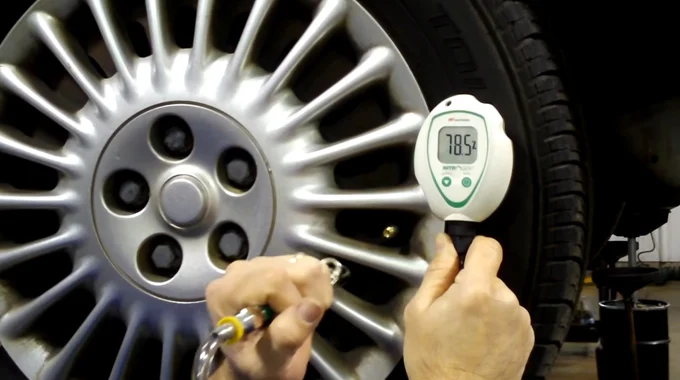Last Updated on March 14, 2023
Nitrogen tire pressure is something that many people don’t think about when they are driving, but it’s really important to make sure your tires have enough in them.
Don’t worry if you’re not sure how to check nitrogen tire pressure or what the right amount of nitrogen tire pressure should be; this article will help answer those questions and more.
What Should You Know Before Checking?
When it comes to checking nitrogen tire pressure, there are a few things you need to know.
- Make sure your car is on a level surface when you check the pressure.
- The temperature outside can affect the pressure, so make sure to consider that.
- Check the pressure when the tires are cold (meaning they haven’t been driven recently).
How to Check Nitrogen Tire Pressure Accurately?
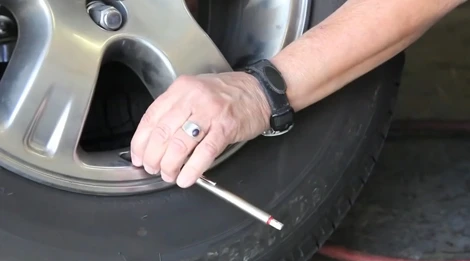
Now that you know what you need to before checking the pressure, it’s time to learn how to do it.
1. Find the Recommended PSI:
Recommended PSI or pounds per square inch is the amount of pressure your car’s tires should have. You can find this information in your car’s owner’s manual or on the sidewall of your tire.
2. Find a Gauge:
You will need a gauge to measure the PSI in your tires. This can be purchased at most auto stores, or you can use a meter on your phone.
3. Inflate Your Tires To The Recommended PSI:
Once you have the gauge, inflate your tires to the recommended PSI as listed in the owner’s manual or on the sidewall of your tire.
4. Check the Pressure With The Gauge:
Once the tires are inflated to the recommended PSI, check the pressure with the gauge.
5. Compare the Reading On The Gauge:
If the reading on the gauge is higher than the recommended PSI, you need to let out some air; if it’s lower, you need to add air.
6. Record the Pressure:
Please make a note of the current pressure in your tires, so you can track it and make sure it’s at the recommended PSI.
7. Repeat this Process Every Few Months:
You should check the nitrogen tire pressure in your car every few months to ensure everything is still at the recommended PSI.
Now that you know how to check the nitrogen tire pressure do it regularly! It’s an essential part of keeping your car safe and in good condition.
A Tire With Nitrogen Inflation: How Do You Tell?
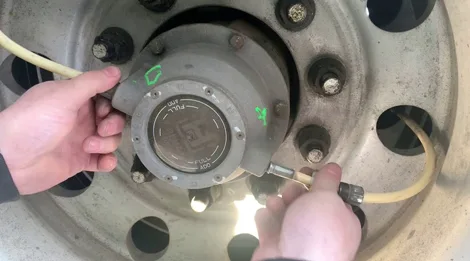
If you’re unsure whether or not your tires are nitrogen inflated, there are a few things you can look for.
1. The Stickers:
When a tire is nitrogen inflated, there will usually be a sticker on the sidewall that says so.
2. The Color of the Valve Stem:
The valve stem is the part of the tire that you use to add or let out the air. If the valve stem is black, it’s likely been filled with nitrogen; if it’s silver, then it’s not been filled with nitrogen.
3. The PSI:
The recommended PSI for a nitrogen-filled tire is usually higher than for a tire that’s not been filled with nitrogen.
4. Connect a Portable Nitrogen Analyzer:
If you’re still not sure, you can connect a portable nitrogen analyzer to the valve stem. If the reading is between 80-95%, the tire is most likely nitrogen inflated.
5. Check with the Dealership Or Mechanic:
If you’re still unsure, you can always check with the dealership or mechanic. They will be able to tell you for sure whether or not your tires are pure nitrogen inflated.
What Are The Benefits Of Nitrogen Inflation?
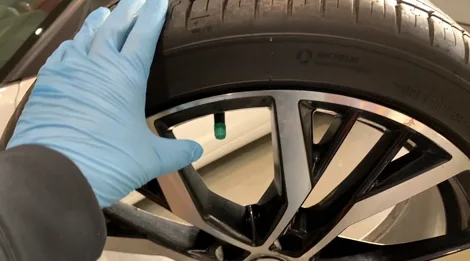
There are many benefits to using nitrogen in your car’s tires instead of regular air.
1. It Lasts Longer:
Nitrogen inflation usually lasts longer than regular air inflation. This means you won’t have to check and add air as often.
2. It’s More Stable:
Nitrogen is more stable than regular air, meaning the pressure in your tires will be more consistent. This is important for things like tire wear and fuel economy.
3. It doesn’t Leak As Much:
Since nitrogen is less likely to leak out of the tire service, you won’t have to add air as often. This is good for both your tires and your wallet!
4. It’s Better For The Environment:
Nitrogen inflation is also better for the environment since it doesn’t require the use of fossil fuels.
5. It’s Safer:
It’s generally safer than regular air inflation since nitrogen inflation is more stable and doesn’t leak as much.
All of these benefits make nitrogen inflation an excellent choice for your car’s tires!
Does Nitrogen Last Long In Car Tires?
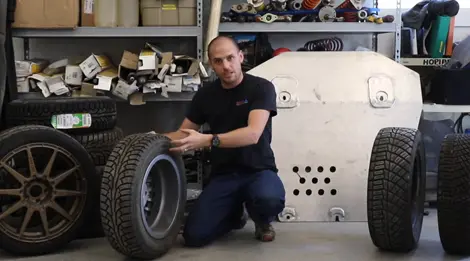
As the tire moves, its strands of rubber expand and contract, giving the appearance of solidity and impermeability. In doing so, air molecules are allowed to seep out slowly, which is why the tire deflates at a rate of approximately 1.5 pounds per month.
The nitrogen molecules appear to be more prominent than air molecules, making them less inclined to leak out as quickly. Regarding oxygen, nitrogen has a diffusion rate that is about a third as high as the diffusion rate of ordinary air. Therefore, it is estimated that nitrogen-filled tires drop in air pressure at a rate of approximately 0.5 to 0.75 pounds per month due to wear and tear over time.
FAQ’s
What is The Recommended Psi for Nitrogen-Filled Tires?
On average, the tires filled with air at 3.5 psi of pressure while the tires filled with nitrogen 2.2 psi. Thus, the difference between the two methods is only 1.3 psi. Regardless of the type of air in the tires, all of them lost pressure.
Is Nitrogen Inflation Better for The Environment?
If nitrogen is inflated into a tire, it minimizes moisture and oxygen, which doesn’t cause the rubber to degrade and doesn’t allow corrosion as with compressed air.
Is It Safe to Use Nitrogen Inflation?
Since nitrogen is less likely to leak out of the tire, you won’t have to add air as often. This is good for both your tires and your wallet! Additionally, nitrogen inflation is more stable and doesn’t leak as much, so it’s generally considered safer than regular air inflation.
Conclusion
Nitrogen inflation is a great choice for your car’s tires! Not only does it last longer, but it’s also more stable and doesn’t leak as much. Plus, it’s better for the environment and safer than regular air inflation. We hope this article has been helpful in explaining the benefits of nitrogen inflation and how it can help you keep your car’s tires in top condition.
